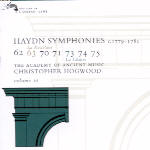Listening to this set reminded me of the story of the elderly Florida couple walking out of a restaurant after finishing the early-bird special, and the husband turns to his wife and complains, “You know, the food there was terrible.” “Yes,” his wife agrees, “and such small portions too!” How is this relevant? Well, you would think that any company engaged in an undertaking of this magnitude would at least leave the recordings in print long enough for collectors or newcomers to the series to get all the volumes (and this is No. 10 out of a projected 15). No such luck. At least half of Christopher Hogwood’s Haydn series has already been deleted, even in the UK. In fact, the L’Oiseau Lyre imprint itself has been discontinued, making these sets (which still sport the old label) appear even more anachronistic–nor have previous installments been overly generous in terms of disc timing. It’s a classic case of bad planning all around: “small portions” indeed!
Unfortunately, none of the above is terribly useful, because the performances themselves stand as the dullest available. Hogwood’s approach to this music lacks any vestige of emotional involvement. He’s completely mechanical. Slow movements, with their vibrato-less strings and thin tone sound completely soulless, while the quicker ones move with a choppy, routine vigor. As an example, compare the brilliant triple-fugue finale of Symphony No. 70 to a couple of past versions. David Blum with the pick-up Esterhazy Orchestra on Vanguard offers a swifter basic tempo with more vivid dynamic contrasts and far richer instrumental color. Dorati’s classic version (on Decca) has more weight, and while heavier, really brings out the minor-key mystery and threat latent in the movement’s quieter passages. Both versions not only characterize the music infinitely more strongly than does Hogwood, they reveal more inner detail and tension, and order the movement in big, sweeping paragraphs rather than in short, clipped phrases.
This is the kind of project that any critic would love to be able to support whole-heartedly, but in this case it might actually make the most sense, assuming Hogwood has finished the cycle (these recordings are more than five years old, so it’s possible), to delete the rest of the remaining volumes, generously recouple the discs, and simply reissue the thing complete at budget price. I don’t see any other viable alternatives for this half-hearted, lackluster effort.
































